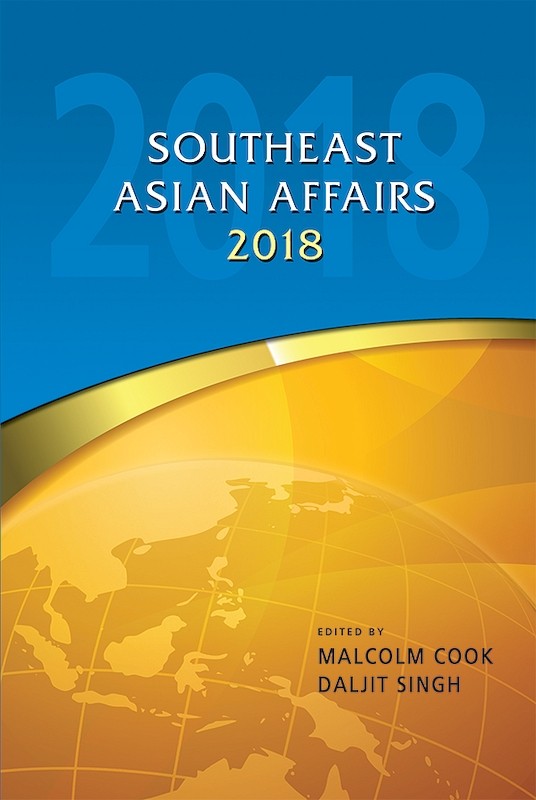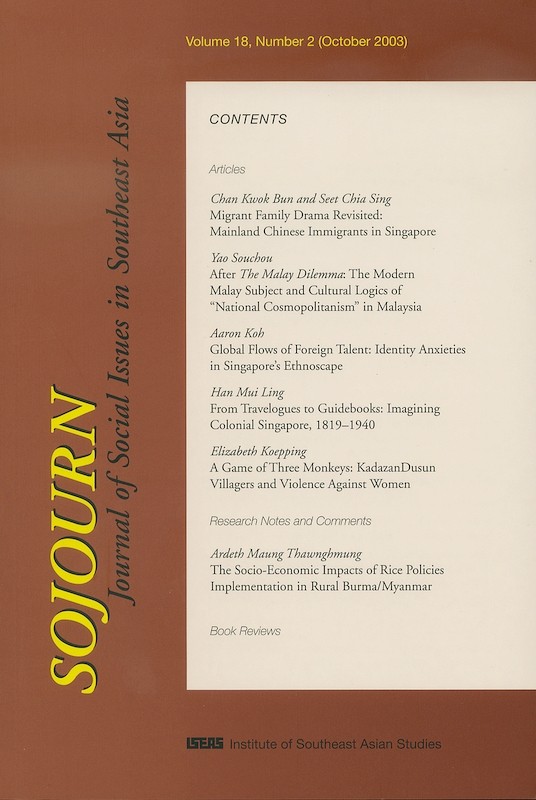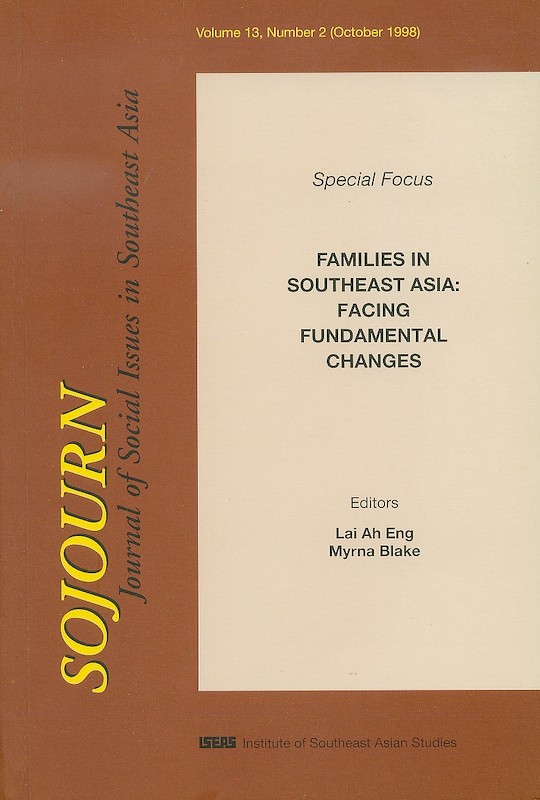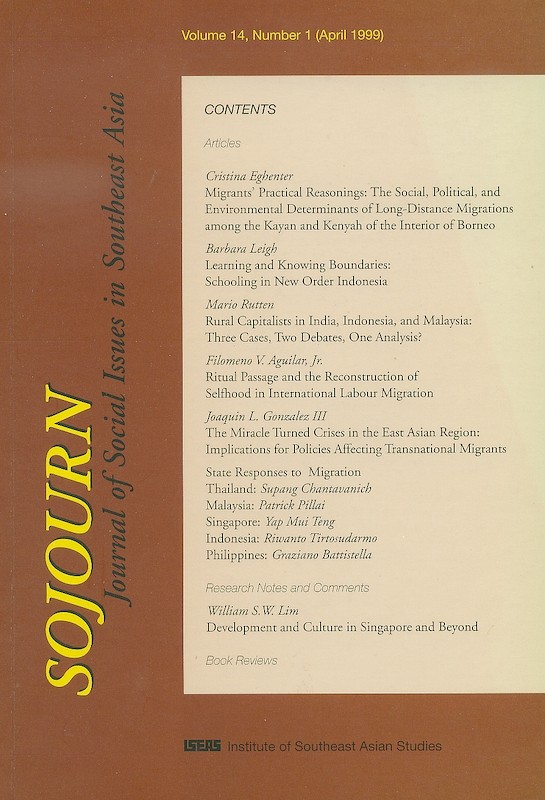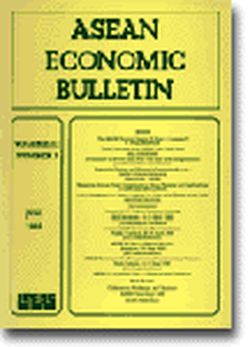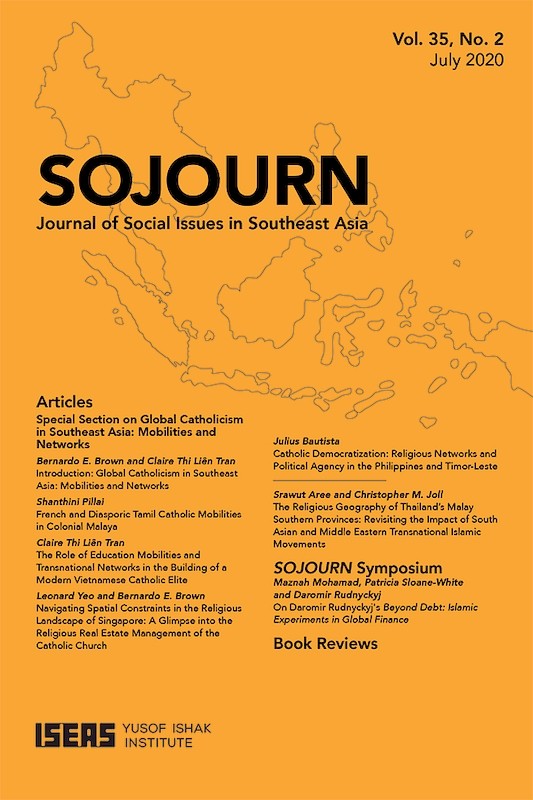SOJOURN: Journal of Social Issues in Southeast Asia Vol. 12/2 (Oct 1997). Special Focus on "Southeast Asian Diasporas"
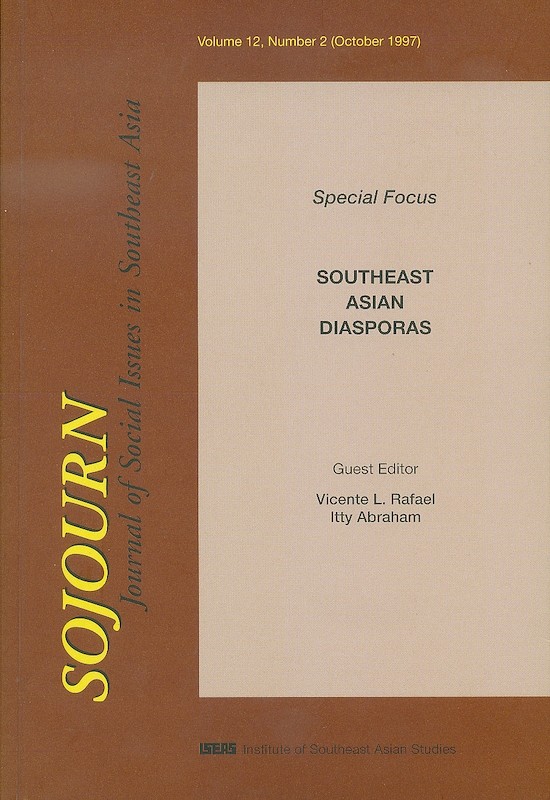
Date of publication:
October 1997
Publisher:
Institute of Southeast Asian Studies
Number of pages:
219
Code:
SJ12/2
About the publication
Special Focus Issue on the Southeast Asian Diasporas, edited by Vicente L. Rafael and Itty Abraham
Contents
-
Preliminary pages
-
Introduction, by Vicente L. Rafael, Itty Abraham, editors
-
Domestic Bodies of the Philippines, by Neferti Xina M. Tadiar, contributor see abstractReports about the exploitation and abuse of Filipina domestic workers abroad increasingly depict Filipina domestic helpers as being treated as bodies without subjectivity. Their treatment as corporeal objects of use is the product and process of the congruence of the logics of sexism, racism, and commodity fetishism in the creation of domestic labour. The violent bodily treatment of Filipina domestic helpers which such reports portray is repeated by the media in the latter's use of the domestic helpers' bodies as signs and sites for the nation's struggle for subject-status on the global scene. What is stolen from these women, which escapes the tragic tales told by the media, is their collective creative power that is their subjective potential. As opposed to the government and the media, feminist artists attempt to actualize and create access to this power and potential. The transformative possibilities offered by these expressive works are created by commandeering and mobilizing precisely the subjective form through which Filipina women are exploited. The feminist practice of gathering the creative living power of Filipinas for the liberation of our subjective potential and for our social empowerment is inspired by the words and practices of gathering which domestic helpers themselves have engaged and continue to engage in.
-
"A Better Tomorrow"? The Struggle for Global Visibility, by Aihwa Ong, contributor see abstractThis paper argues that new publics are being configured by globalization, and that these transnational publics engage state power in a variety of ways. Emerging fields of translocal connection and norm-making -- in spaces of global visibility -- are regulated by the power relations of mass media, trade, and financial markets. These ideas are explored through an account of three ethnicized Chinese publics -- based on the overseas Chinese mass media, as well as the transnational circulation of ethnic Chinese professionals and of Asian capital. These three publics, it is argued, produce new kinds of ethnicized normativities -- reflecting ambivalences over capitalism, the masculine embodiment of Pacific Rim capital, and assumptions about its global nature -- that induce particular kinds of subjectivity and citizenship among the diasporic Chinese.
-
Diasporic Imagings and the Conditions of Possibility: Sikhs and the State in Southeast Asia, by Verne A Dusenbery, contributor see abstractThe comparative experience of Sikhs in post-colonial Indonesia, Singapore, and Malaysia suggests that the state, through its abilities to constrain global flows of people and images and to recognize and manage social difference within the polity, remains a powerful force in mediating transnational processes and diasporic identities.
-
Globalism and the Pursuit of Authenticity: The Making of Diasporic Public Sphere in Singapore see abstractThis paper examines the role of diaspora in the history of colonial Singapore, the creation of the intellectual culture that embodies both the demands of globalism and the desire for authenticity. It traces the emergence of a polyglot migrant world where communities not only had to find ways to relate to distant homelands, but had to learn to speak to each other for the first time. Through a study of the systems of communication and knowledge that transected Singapore, the paper argues that the predicaments of "globalism" have a much deeper history than much of the discursive work on the concept suggests. It emphasizes the multiple layers of sociability within colonial society. This, it is argued, might tell us more about being a diaspora in a society where others have cultural primacy. In the light of these it assessed the role of the colonial state: its capacity to set the boundaries of participation and impose its constructions of community and law upon Singapore¹s diasporic public sphere.
-
Economic Development, Migration, and Ethnic Conflict in Indonesia: A Preliminary Observation, by Riwanto Tirtosudarmo, contributor see abstractIndonesia¹s current population is two hundred million. The population, although divided into approximately three hundred ethnic groups, includes relatively few significant ethnic entities, and of these, the Javanese is the largest. The majority of the population is Muslim, but other religions with a minority status are protected under the precepts of Pancasila, the uniting state ideology. When the New Order government took power in 1966 its highest priority was economic development and it also regulated political activities. In this context, social and political issues considered by the government to be potentially divisive ⹠such as class and ideological cleavages, ethnicity, race, and religion ⹠have been strongly submerged. Recent social and political developments indicate that the political-demographic configuration of the society is experiencing a rapid change, and there have been conflicts between groups or classes of the population. This paper is an attempt to explain the increasing conflicts, particularly between migrants and various local ethnic groups, from the broader perspectives of economic and political changes under the New Order.
-
The Nationalist Project and Contradictions in Federal-State Relations, by Vejai Balasubramaniam, contributor see abstractNationalism and the nationalist project in the newly independent states of Southeast Asia is informed by the objective of creating a nation-state. In view of the polities¹ extreme diversity in terms of people and culture, the homogenizing effect of the project is expected to present significant challenges to the respective governments. The task is especially daunting in states where nationalism led to the formation of a federalist state. This is because the nation-state is viewed or "imagined" as a unitary state. Thus, the economic and political themes of the nationalist project will give rise to problems in federal-state relations. Discussions on the modernization process in Malaysia have tended to be overwhelmingly concerned with the implications of the nationalist project on the multi-cultural polity resulting in an inadequate understanding of the scenario. To augment our understanding of modernization in Malaysia, attention too must be given on its implications on federal-state relations. This article examines why.
- BOOK REVIEW
-
BOOK REVIEW: Sites of Desire, Economies of Pleasure: Sexualities in Asia and the Pacific. Edited by Leonore Manderson and Margaret Jolly, by Philip Holden, contributor
-
BOOK REVIEW: Origins, Ancestry and Alliance. Explorations in Austronesian Ethnography. Edited by James J. Fox and Clifford Sather, by Victor T King, contributor
-
Conferences, Workshops, and Seminars
-
Index to Volume 12

